
January 27
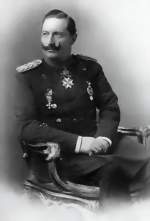
1859 Birth: The future Kaiser Wilhelm II of Germany: in Berlin to Prince Frederick William of Prussia and his wife, Victoria, Princess of Prussia (born Princess Royal of the United Kingdom), thus making him the first grandson of Queen Victoria of the United Kingdom, whom he loved and respected. As the son of the Crown Prince of Prussia, Wilhelm was (from 1861) the second in the line of succession to Prussia, and also, after 1871, to the German Empire, which according to the constitution of the German Empire was ruled by the Prussian King. As with most Victorian era royalty, he was related to many of Europe's royal families.
"A traumatic breech birth left him with a withered left arm due to Erb's palsy, which he tried with some success to conceal. In many photos he carries a pair of white gloves in his left hand to make the arm seem longer, or has his crippled arm on the hilt of a sword or holding a cane to give the effect of a useful limb being posed at a dignified angle. Several biographers have suggested that this disability affected his emotional development."
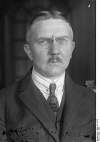
1877 Birth: Hjalmar Schacht: financial wizard of the Third Reich; President of the Reichsbank until 1939 and Minister without Portfolio until January 1943. Schacht will be acquitted at Nuremberg in 1946 despite protests by the Soviet judge.
1883 Birth: Gottfried Feder: in Wurzburg, Germany:

During the First World War Feder developed a hostility to Germany's wealthy bankers and in 1919 he published his Manifesto on Breaking the Shackles of Interest. In 1919 Feder joined with Anton Drexler and Dietrich Eckart to form the German Workers's Party (GPW) in Munich. Adolf Hitler joined the party soon afterwards.
Hitler successfully persuaded members of the GWP should change its name to the National Socialist German Workers Party (NSDAP). In February 1920, Feder joined with Hitler and Drexler to draft what became known as the "25 Points". In the programme the party refused to accept the terms of the Versailles Treaty and called for the reunification of all German people. To reinforce their ideas on nationalism, equal rights were only to be given to German citizens. "Foreigners" and "aliens" would be denied these rights.
To appeal to the working class and socialists, the programme included several measures that would redistribute income and war profits, profit-sharing in large industries, nationalization of trusts, increases in old-age pensions and free education.
The programme was also reflected the racist views shared by party members. It appealed to the Anti-Semitism that existed in Germany at that time by stating that "Citizenship is to be determined by race; no Jew to be a German."
Feder greatly influenced the anti-capitalist aspect of the Nazi programme and insisted on phrases such as the need to "break the interest slavery of international capitalism" and the claim that Germany had become the "slave of the international stock market".
On 24th February, 1920, the NSDAP (later nicknamed the Nazi Party) held a mass rally where it announced its new programme. The rally was attended by over 2,000 people, a great improvement on the 25 people who were at Hitler's first party meeting. Feder published his book, National and Social Bases of the German State in 1920. In 1923 Feder took part in the Beer Hall Putsch. He remained one of the leaders of the party and in 1924 was elected to the Reichstag.
Throughout the 1920s Feder was a leader of the anti-capitalist wing of the Nazi Party. He put forward his views in Das Programm der NSDAP (1931), Kampf gegen die Hochfinannz (1933) and Die Juden (1933) where he expressed his antisemitic views.
As Feder held the important post of chairman of the party's economic council, his anti-capitalist views led to a decline in financial support from Germany's major industrialists. After pressure from figures such as Albert Voegler, Gustav Krupp, Friedrich Flick, Fritz Thyssen, Hjalmar Schacht and Emile Kirdorf, Hitler decided to move the party away Feder's left-wing economic theories.
When Adolf Hitler became chancellor in 1933 he appointed Feder as Under-Secretary at the Ministry of Economics. Feder was disappointed that he had not been given a more senior position. However, as one of the leaders of the left-wing of the Nazi Party, Hitler saw him as a threat to his leadership.
After the Night of the Long Knives where other left-wingers such as Gregor Strasser and Ernst Roehm were murdered, Feder resigned from the government. Gottfried Feder worked as a university lecturer until his death on 24th September, 1941.
1897 Birth: Carl Oberg: Supreme Head of the SS and Police in occupied France from 1942 to 1945. Will be arrested by American military police in June 1945, and sentenced to death by courts in both Germany and France before being pardoned by French President Charles de Gaulle in 1965.
1900 Birth: Hyman G. Rickover: American naval officer and nuclear engineer:
Rickover graduated from the U.S. Naval Academy at Annapolis, Md., in 1922. He studied electrical engineering at Columbia University . . . and then took submarine training at New London, Conn. After serving on various submarines and on the battleship USS New Mexico, he was given command of the USS Finch, a minesweeper, in 1937. In 1939 he was assigned to Washington, D.C., to the Electrical Section of the Navy Department's Bureau of Ships; he later headed this section throughout World War II. In 1945 and 1946 he held posts in Okinawa and in San Francisco.
In June 1946 Rickover went to Oak Ridge, Tenn., for further instruction in nuclear physics and engineering as part of the old Manhattan Project, which had developed the atom bomb. Returning to the Bureau of Ships in September 1947, he began to manage the navy's nuclear-propulsion program. His energy, frequently unorthodox methods, and ability to elicit almost fanatical devotion from his team of specialists were key factors in the development and early delivery of the Nautilus, whose keel was laid in June 1952 and which was launched on Jan. 21, 1954.
While continuing his duties with the navy, Rickover also took charge of research on reactor development for the Atomic Energy Commission, helping to develop the first full-scale, civilian-use nuclear power plant in the United States at Shippingport, Pa. (1956–57). He was promoted to the rank of rear admiral (1953), vice admiral (1959), and admiral (1973). Throughout his career Rickover was a controversial figure because of his outspoken and even abrasive demeanour and his single-minded insistence on the development of nuclear power. He retired from the U.S. Navy in 1982, after serving as an officer for 63 years, a record made possible by an act of Congress that specially exempted him from having to retire at the age normal for senior admirals. (Britannica.com).]
1918 World War I: Workers prepare to strike in Germany:
Plagued by hunger and increasingly frustrated with the continuing Great War, hundreds of thousands of long-suffering German workers prepare for a massive strike in Berlin.
Although the year 1917 had brought a string of military triumphs to the Central Powers—Kaiser Wilhelm, on a visit to the Western Front in December, told his troops that the year's events proved that God was on the side of the Germans—it had also seen hunger and discontent on the home front rise to unprecedented levels. There were a total of 561 strikes in 1917, up from 240 the year before and 137 in 1915. Real wages—or the ratio of wages to cost of living—were falling, with disastrous effects for industrial and white-collar workers alike.
War with Russia had cut Germany and Austria-Hungary off from a crucial supply of food and the Allied naval blockade in the North Sea, in effect since early in the war, had exacerbated the resulting shortages. At the beginning of 1918, the thorny negotiations between Russia and the Central Powers at Brest-Litovsk promised to delay a much-needed influx of food and resources even longer. Discontent flared first in Austria, where flour rations were cut in mid-January. Strikes began almost immediately in Vienna and by January 19 there was a general strike throughout the country.
Food shortages were even worse in Germany, where some 250,000 people had died from hunger in 1917. On January 28, 1918, 100,000 workers took to the streets of Berlin, demanding an end to the war on all fronts. Within a few days, the number was up to 400,000. The Berlin strikers enjoyed support in a string of other major cities, including Dusseldorf, Kiel, Cologne and Hamburg. By one estimate, more than 4 million took to the streets across Germany.
The reaction of the German government and the army—frightened by visions of Bolshevik-style revolution and worried the workers' revolt would further delay the peace talks at Brest-Litovsk—was swift and decisive. On January 31, a state of siege was declared and the ringleaders of the strikes were arrested and court-martialed. One hundred and fifty were imprisoned, while 50,000 more were drafted into the army and sent to the front. (History.com)
1923 Weimar: Jan 27-29 The NSDAP holds its first ever Party Rally in Munich. (Maser)
1932 Hitler gives an important speech in Dusseldorf, at the Industry Club:
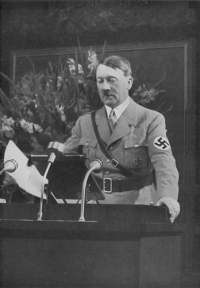
There are . . . two other closely related factors which we can time and again trace in periods of national decline. The one is that for the conception of the value of personality there is substituted a leveling idea of the supremacy of mere numbers: Democracy. And the other is the negation of the value of a people, the denial of any difference in the inborn capacity, the achievement, etc., of individuals. Thus both factors condition one another, or at least influence each other in the course of their development. Internationalism and democracy are inseparable conceptions.
1934 Joseph Goebbels speaks on a subject of which he knows nothing—Morality:
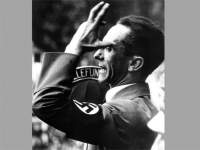
Every revolution has its mistakes, ours too. That is not in itself bad, since they mostly disappear on their own or with time. The important thing is that those in charge keep their eyes open, and do not remain silent when they ought to speak out of fear of the public.
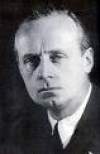
1938 Danzig: Ribbentrop repeats Germany's proposals in Warsaw.
1941 World War II: Various: Countdown to Infamy: Joseph C. Grew, American Ambassador to Tokyo, informs the US State Department that:
The Peruvian minister has informed a member of my staff that he had heard from many sources, including a Japanese source, that, in the event of trouble breaking out between the United States and Japan, the Japanese intended to make a surprise attack against Pearl Harbor. (THP)
World War II: Ezra Pound: an admirer of Mussolini, begins recording talks for broadcast over Rome Radio. He will make more than 300 broadcasts for the Fascists.
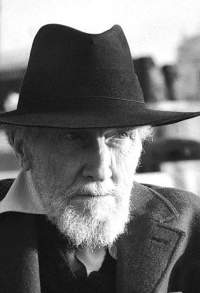
Pound was sure his remarks on radio were not seditious, but were strictly informational and dedicated to traditional principles of Americanism—including the Constitution, in particular. In response to media claims that he was a fascist propagandist, Pound had this to say: "If anyone takes the trouble to record and examine the series of talks I have made over this radio it will be found I have used three sorts of material: historical facts; convictions of experienced men, based on fact; and the fruits of my own experience. The facts . . . mostly antedate the fascist era and cannot be considered as improvisations trumped up to meet present requirements. Neither can the beliefs of Washington, John Adams, Jefferson, Jackson, Van Buren, and Lincoln be laughed off as mere fascist propaganda."

World War II: Romania: Hitler advises Antonescu to "liquidate" the Legionary Movement, and German forces are soon ordered to help crush the Legionaries.
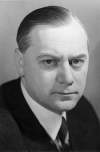
1942 Church and Reich: Rosenberg, with Bormann's concurrence, issues an order forbidding any further discussion of religious questions in the Party's work of ideological indoctrination. (THP)
1943: World War II: Various: Ronald Reagan serves in a film unit: Warner Brothers Studios and the American Army Air Corps had tapped him the previous year to star in a motion picture called Air Force. To allow filming to go forward, Reagan was transferred from his cavalry unit to the Air Corps' motion-picture unit in early January 1943 . . . .
Air Force, which was later renamed Beyond the Line of Duty, conveyed the true story of the heroic feats of aviator Shorty Wheliss and his crew and featured narration by Lt. Ronald Reagan. The documentary, intended to promote investment in war bonds, won an Academy Award in 1943 for best short subject. Reagan went on to narrate or star in three more shorts for FMPU including For God and Country, Cadet Classification, and the The Rear Gunner. Reagan also appeared as Johnny Jones in the 1943 full-length musical film This is the Army. [For further information, click here]
FDR and Churchill to Stalin: We have been in conference with our military leaders and have decided on operations which are to be undertaken by the American and British forces in the first nine months of 1943. We wish to inform you of our intentions at once . . . . We are in no doubt that the correct strategy is to concentrate on the defeat of Germany with a view to achieving an early and decisive victory in the European Theater. At the same time we must maintain sufficient pressure on Japan to retain the initiative in the Pacific . . . . Our main desire has been to divert strong German land and air forces from the Russian front and to send Russia the maximum flow of supplies . . . . Our immediate intention is to clear the Axis out of North Africa and set up naval and air stations to open: (1) an effective passage through the Mediterranean for military traffic, and (2) an intensive bombardment of important Axis targets in Southern Europe. We have made the decision to launch large-scale amphibious operations in the Mediterranean at the earliest possible moment. The preparations for these operations is now under way and will involve considerable concentration of forces, including landing craft and shipping, in Egypt and the North African ports. In addition we shall concentrate within the United Kingdom a strong American land and air force. These, combined with the British forces in the United Kingdom, will prepare themselves to reenter the continent of Europe as soon as practicable . . . . As you are aware, we are already containing more than half the German Air Force in Western Europe and the Mediterranean. We have no doubt that our intensified and diversified bombing offensive, together with other operations which we are undertaking, will compel further withdrawals of German air and other forces from the Russian front . . . . Our ruling purpose is to bring to bear upon Germany and Italy the maximum forces by land, sea and air which can be physically applied. The US Eighth Air Force: First all-American bombing raid on Germany:
Of 64 planes participating in the raid, 53 reached their target and managed to shoot down 22 German planes, and lost only three planes in return.
The 8th Air Force was activated in February 1942 as a heavy bomber force based in England. Its B-17 Flying Fortresses, capable of sustaining heavy damage while continuing to fly, and its B-24 Liberators, long-range bombers, became famous for precision bombing raids . . . . Commanded at the time by Brig. Gen. Newton Longfellow, the 8th Air Force was amazingly effective and accurate in bombing warehouses and factories in this first [American] air attack against the Axis power.
1944 World War II: Siege of Leningrad is lifted:
On this day, Soviet forces permanently break the Leningrad siege line, ending the almost 900-day German-enforced containment of the city, which cost hundreds of thousands of Russian lives.
The siege began officially on September 8, 1941. The people of Leningrad began building antitank fortifications and succeeded in creating a stable defense of the city, but as a result were cut off from all access to vital resources in the Soviet interior, Moscow specifically. In 1942, an estimated 650,000 Leningrad citizens perished from starvation, disease, exposure, and injuries suffered from continual German artillery bombardment.
Barges offered occasional relief in the summer and ice-borne sleds did the same in the winter. Slowly but surely a million of Leningrad's young, sick, and elderly residents were evacuated, leaving about 2 million to ration available food and use all open ground to plant vegetables.
On January 12, Soviet defenses punctured the siege, ruptured the German encirclement, and allowed more supplies to come in along Lake Ladoga. The siege officially ended after 872 days (though it is often called the 900-day siege), after a Soviet counteroffensive pushed the Germans westward. (History.com)
1945 World War II: Various: Memel: The Lithuanian port falls to the Soviets. Patton's Third Army crosses the Our River and captures Oberhausen. [See: The Last Days of the Third Reich.] Hitler: Do you think the English are enthusiastic about all the Russian developments? 
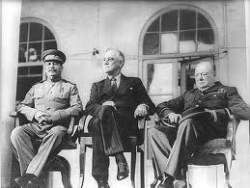


Jodl: No, of course not. They have quite different plans. Perhaps we'll discover the full extent of their plans later.
Goering: They certainly didn't plan that we hold them off while the Russians conquer all of Germany . . . . If this goes on we will get a telegram (from the English) in a few days. They were not counting on us defending ourselves step by step . . . holding them off like madmen while the Russians drive deeper and deeper into Germany, and practically have all of Germany now . . . .
Jodl: The English have always regarded the Russians with suspicion.
Hitler: I have given orders that we shall play a trick on the English: an information sheet telling them the Russians are organizing 200,000 of our men (German POWs) led by German officers, all of them infected with Communism, and they will be marched into Germany. I have ordered this report to be delivered to the English. I have discussed it with the Foreign Minister (Ribbentrop). That will be like sticking them with a needle.
Goering: They entered the war to prevent us from going East, not to have the East reaching out to the Atlantic.
Hitler: That's quite clear. It is something abnormal. The English newspapers are already saying bitterly: Is there any sense in this war?
Goering: On the other hand I have read a report in Braune Blaetter that they can support the Russians with their air force. They can reach the Russian forces with their heavy bombers, even though it is a long flight. But the information comes from an absurd source.
Hitler: Tactically, the English cannot support them. Since we don't know where the Russians are and where we are, how on earth can the English know?

After the conclusion of the daily situation conference, Hitler receives an unpleasant communication from General Schoerner (above, left) at Army Group Center requesting that the evacuation of the industrial and mining region of Silesia be ordered. Hitler is silent on the other end. Schoerner continues: 'These troops have been fighting a heavy battle for two weeks, and now they're finished. If we don't relieve them, we're going to lose the whole Seventeenth Army, and the road to Bavaria will be wide open. We're moving back to the Oder, and there we will stop.' The silence on the other end of the line continues. Eventually Hitler wearily replies, 'Yes, Schoerner. If you think it's right I'll have to agree.' This is perhaps one of the last examples of Hitler actually making a rational decision. (Read)
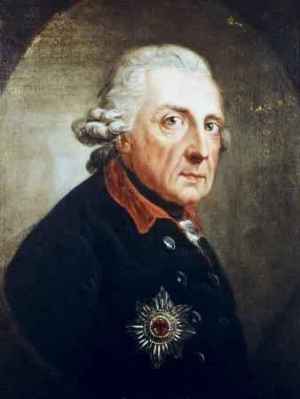
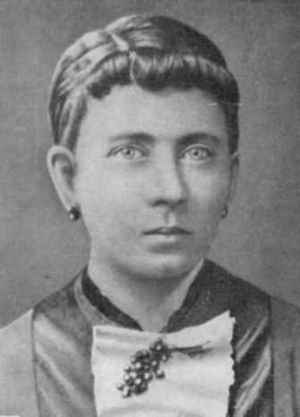
Goebbels is pleased that his Fuehrer is back in Berlin, and since his return he has been spending much of his time boosting the dictator's morale. Goebbels plays on Hitler's hero-worship of Frederick the Great, whose portrait (by Anton Graff) the former Austrian lance corporal keeps by his bed next to his mother Klara's one known photograph. A book on Frederick by English writer Thomas Carlyle, a 'singularly effuse and boring account of his battles,' is utilized by the master of propaganda to make the case that even in the darkest hour, some unforeseen event can still turn the tide. His efforts seem to bear some fruit this day, as Goebbels confides to his diary that Hitler said to him that he wanted 'to show himself worthy of the great examples of history. He would never be found to waver in the face of danger.' Note: Goebbels, just as Goering had done earlier, urges Hitler to fire Ribbentrop, but Hitler again refuses to do so. (Read)

From the first year of the reign of Frederick the Great in 1740, he was at war with Maria Theresa of Austria and various combinations of Austria's allies, and was undefeated until 1757. From that point on, he suffered various defeats in battle and the occupation of territory by his enemies. Despite a victory at Liegnitz on 15th August 1760, when he was outnumbered three to one, this did not prevent the Russians and Austrians from occupying Berlin, twice in September and October 1760 until they left, under the impression that Frederick was en route to relieve the capital. In December 1761, the Russians sailed nineteen ships, bearing 7,000 troops to Kolberg, on the mouth of the river Persante. There was also support on land. On 6th December nearly 3,000 Prussians surrendered to the Russians, who captured 146 guns.
In addition, the Austrians captured Schweidnitz, in Silesia. George 2nd was threatening to halt Britain's financial support to Prussia. Frederick's position was becoming untenable and he was contemplating suicide [ring a bell?]. But as Carlyle overstated it: "Brave king! Wait yet a little while, and the days of your suffering will be over. Already the sun of your good fortune stands behind the clouds, and soon will rise upon you." The [so-called] Miracle of the House of Brandenburg came to pass: on 5th January 1762 Frederick's enemy, the Tsarina Elizabeth died. The death of the Tsarina was a miracle for the House of Brandenburg, but scarcely of the House of Brandenburg. Be that as it may, her successor, Peter 3rd was an admirer of Frederick, and immediately withdrew the Russian army from Berlin and negotiated a truce between Prussia and Sweden. As a result, Frederick was free to expel the Austrians from Silesia as the result of the Battle of Freiberg on 29th October 1762. (Levi Bookin)
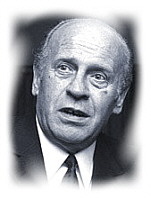
Holocaust: Oscar Schindler—a German Catholic and member of the Nazi Party—who owns a number of factories in the area, saves 85 Jews from a train at Bruennlitz. They had been locked in their cattle-cars for a week, and more than 20 had already died. Schindler releases the Jews and gives them food and shelter at the risk of his own life:
To more than 1200 Jews Oscar Schindler was all that stood between them and death at the hands of the Nazis. A man full of flaws like the rest of us: the unlikeliest of all role models who started by earning millions as a war profiteer and ended by spending his last pfennig and risking his life to save his Jews. An ordinary man who even in the worst of circumstances did extraordinary things, matched by no one. He remained true to his Jews, the workers he referred to as "my children." In the shadow of Auschwitz he kept the SS out and everyone alive.
Oscar Schindler and his wife Emilie Schindler were inspiring evidence of courage and human decency during the Holocaust. Emilie was not only a strong woman working alongside her husband but a heroine in her own right. She worked indefatigably to save the Schindler-Jews: a story to bear witness to goodness, love and compassion. Today there are more than 7000 of the Schindler-Jews and their descendants, living in US and Europe, many in Israel.
1951 First atomic detonation at the Nevada test site:
Forcefully marking the continued importance of the West in the development of nuclear weaponry, the government detonates the first of a series of nuclear bombs at its new Nevada test site.
Although much of the West had long lagged behind the rest of the nation in technological and industrial development, the massive World War II project to build the first atomic bomb single-handedly pushed the region into the 20th century. Code named the Manhattan Project, this ambitious research and development program pumped millions of dollars of federal funds into new western research centers like the bomb building lab at Los Alamos, New Mexico and the fissionable material production center at Hanford, Washington. Ironically, the very conditions that had once impeded western technological development became benefits: lots of wide-open unpopulated federal land where dangerous experiments could be conducted in secret.
After the war ended, the West continued to be the ideal region for Cold War-era nuclear experimentation for the same reasons. In December 1950, the Atomic Energy Commission designated a large swath of unpopulated desert land 65 miles northwest of Las Vegas as the Nevada Proving Ground for atmospheric atomic testing. On January 27, 1951, the government detonated its first atomic device on the site, resulting in a tremendous explosion, the flash from which was seen as far away as San Francisco.
The government continued to conduct atmospheric tests for six more years at the Nevada site. They studied the effects on humans by stationing ground troops as close as 2,500 yards from ground zero and moving them even closer shortly after the detonation. By 1957, though, the effects of radioactivity on the soldiers and the surrounding population led the government to begin testing bombs underground, and by 1962, all atmospheric testing had ceased.
In recent years, the harm caused to soldiers and westerners exposed to radioactivity from the Nevada test site has become a controversial topic. Some critics argue the government waged a "nuclear war on the West," and maintain that the government knew of the dangers posed to people living near the test site well before the 1957 shift to underground tests. Others, though, point out that the test site has brought billions of dollars into the state and resulted in great economic benefit to Nevada. (History.com)
1965 Spandau Prison: From Spandau: The Secret Diaries, by Albert Speer:
This morning [Baldur von] Schirach told British director Procter that he could no longer see anything with his right eye . . . . Schirach is suffering from detached retina. An hour later he was transferred to the infirmary. (Speer II)

1967 Various: Apollo/Saturn-204 catches fire on the launch pad, during a pre-launch test of the spacecraft at Cape Canaveral. Command Pilot Virgil "Gus" Grissom, Senior Pilot Edward H. White, and Pilot Roger B. Chaffee all perish in the Command Module cabin, which contains an atmosphere of pure oxygen. The name Apollo 1, chosen by the crew, is officially assigned retroactively in commemoration of them. [See: Wunderwaffen: Hitler's Deception and the History of Rocketry.]
Nuclear weapons: More than 60 nations sign a treaty banning the orbiting of nuclear weapons. (AP)
1973 U.S. officially ends participation in a Cold War conflict:
The Paris Peace Accords are signed by officials from the United States and North Vietnam, bringing an official end to America's participation in its most unpopular foreign war. The accords did little, however, to solve the turmoil in Vietnam or to heal the terrible domestic divisions in the United States brought on by its involvement in this Cold War battleground. [For further information, click here]
2011 Germany's President Christian Wulff visits Auschwitz-Birkenau:

Wulff's official delegation also comprised several Holocaust survivors (among them WJC Vice-President Charlotte Knobloch), the head of Germany's Jewish community Dieter Graumann, the president of the Sinti and Roma community in Germany Romani Rose, and members of parliament . . . . Together with his Polish counterpart, President Bronislaw Komorowski, Wulff visited the International Youth Meeting Center at Auschwitz where both men discussed with young people and survivors . . . .
Wulff became the first German head of state ever to speak during the official remembrance ceremony at Birkenau, where most of the victims died in huge gas chambers. He declared: Since World War II, across the globe there has not been a single day without war. We continue to witness massacres and genocide on an ethnic, racial, religious, or linguistic basis. This is an appeal to youth to take responsibility for what is happening. Indifference is the worst threat to democracy and liberty. He said Germany had an "eternal" obligation to remember the Shoah.
Edited by Levi Bookin (Copy editor) Click to join 3rdReichStudies FAIR USE NOTICE: This site may contain copyrighted material the use of which has not always been specifically authorized by the copyright owner. We are making such material available in our efforts to advance understanding of historical, political, human rights, economic, democracy, scientific, environmental, and social justice issues, etc. We believe this constitutes a 'fair use' of any such copyrighted material as provided for in section 107 of the US Copyright Law. In accordance with Title 17 U.S.C. Section 107, the material on this site is distributed without profit to those who have expressed a prior interest in receiving the included information for research and educational purposes. If you wish to use copyrighted material from this site for purposes of your own that go beyond 'fair use', you must obtain permission from the copyright owner. Please note that the list-owner and the moderators are not responsible for, and do not necessarily approve of, the random ads placed on our pages by our web server. Unfortunately, they are the price one pays for a 'free' website.
levi.bookin@gmail.com






